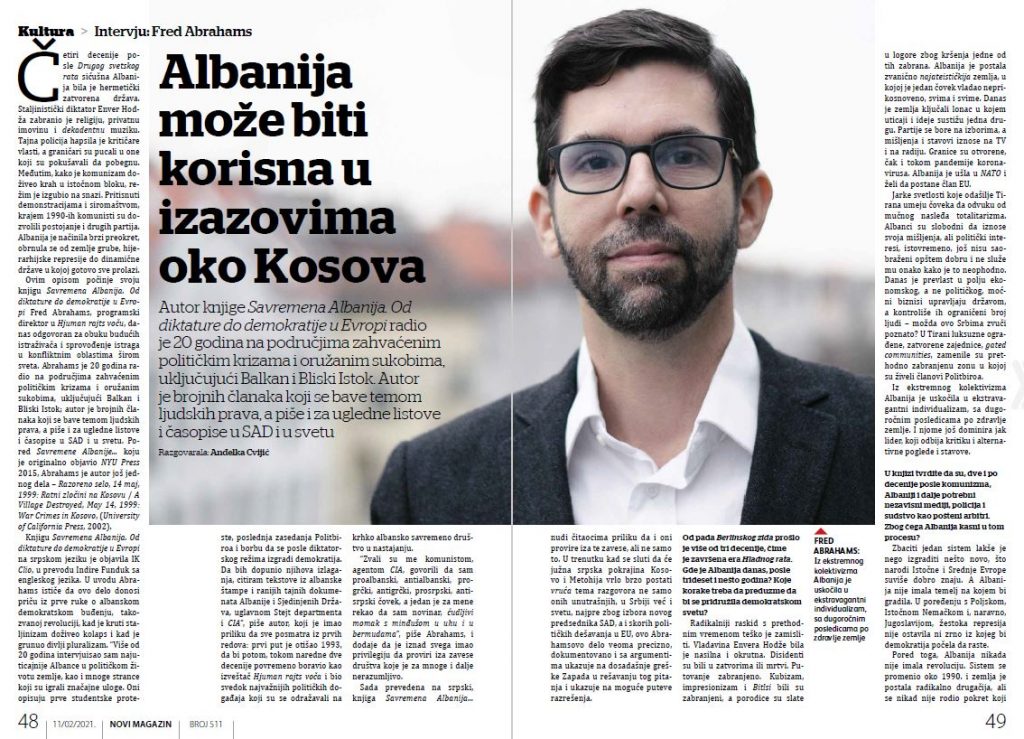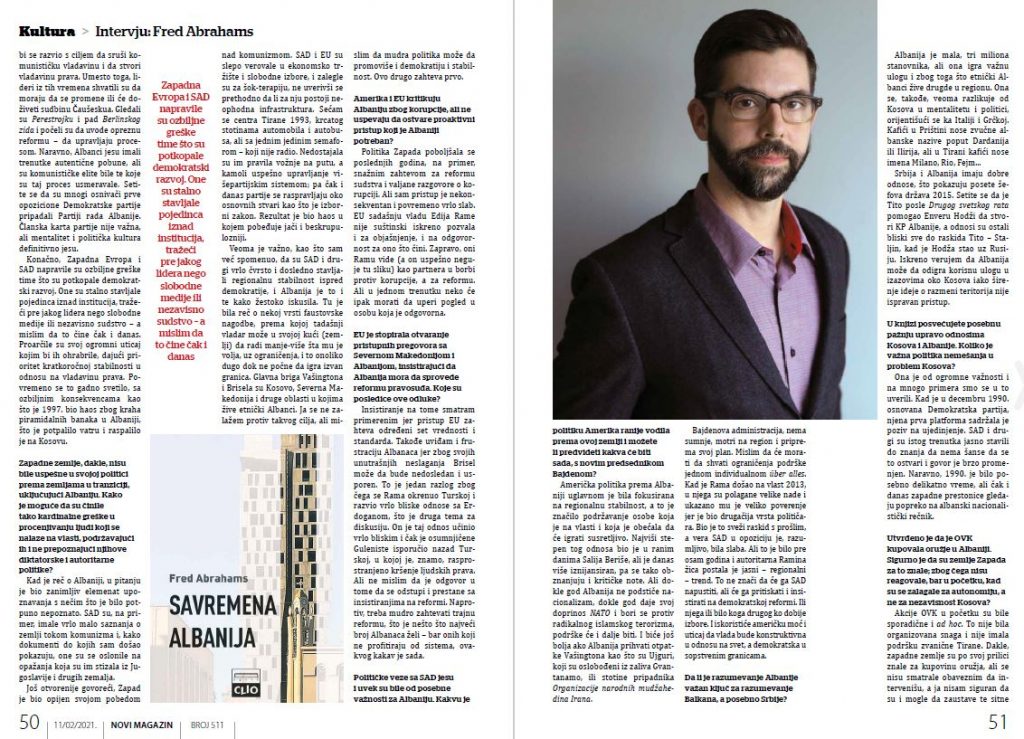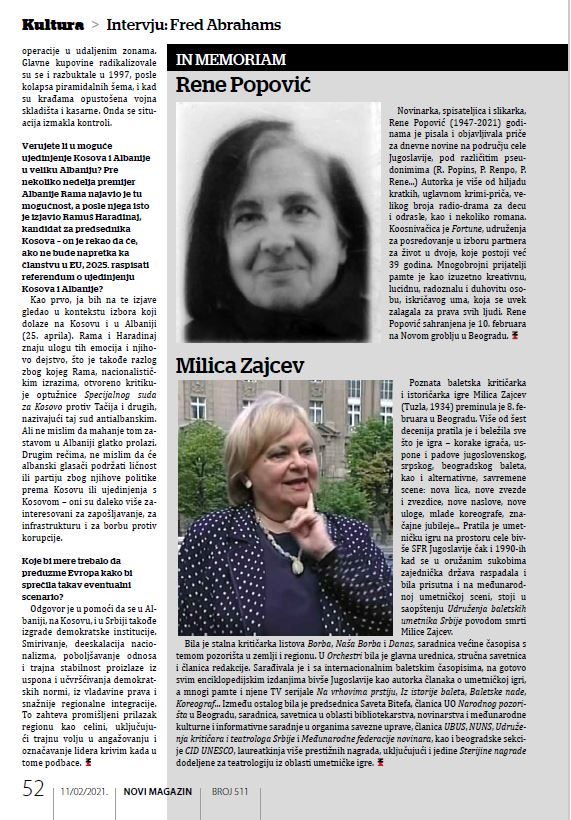February 11, 2021
Albania can be useful in the challenges with Kosovo
1. It has been more than three decades since the fall of the Berlin Wall, which put an end to the Cold War era. Where is Albania today, more than 30 years later? What steps has Albania taken towards the democratic world?
It is difficult to imagine a more radical break. Enver Hoxha’s rule was violent and cruel. Dissidents were in prison or dead. Travel was forbidden. Cubism, impressionism, and The Beatles’ were banned, and families got sent to prison camps for the violations of one. Albania became an officially aethiest country because one man ruled above all.
Today the country is a bubbling pot of influences and ideas. Parties compete in elections and opinions fill the air waves. The borders are open, even during Corona. Albania joined NATO and wants to enter the EU.
At the same time, Tirana’s bright lights can distract one from the gnawing legacy of totalitarianism. Albnians are free to speak their minds but politics still don’t adequately serve the public good. And the controls today are more economic than political with powerful business interests dominating the state, controlled by a limited number of men – maybe that sounds familiar for Serbs? In Tirana, luxury gated communities have replaced the previously forbidden area where Politburo members lived.
Albania jumped from extreme collectivism to extravagant individualism with long-term effects on the country’s health. And it’s still dominated by a strong leader who rejects criticism and alternative views.
2. In the book you affirm that two and a half decades after communism Albania still needed independent media, police and courts serving as fair arbitrators in the litigation. What are the reasons why Albania has not experienced something new?
To topple a system is easier than to build something new, as the people of East and Central Europe know too well. And Albania had no foundation on which to build. Compared to Poland, East Germany and of course Yugoslavia, the severe repression left no seeds for democratic growth.
In addition, Albania never had a revolution. The system changed around 1990 and the country became radically different but a movement never rose up to overthrow communist rule and construct the rule of law. Instead, the leaders of that time understood that they had to change or they would suffer Ceausescu’s fate. They watched perestroika and the fall of the Berlin Wall and they began to introduce a careful reform – to manage the process. Of course, Albania had moments of genuine revolt, but mostly the communist elites steered the process. Remember that many of the founders of the first opposition party, the Democratic Party, belonged to the Party of Labor. The party card is not important but the mentality and political culture definitely is.
Lastly, West Europe and the United States made serious mistakes that have undercut Albania’s democratic growth. They repeatedly – and I think even today – have placed individuals above institutions, looking for a forceful leader rather than free media or independent courts. They have prioritized short-term stability over the rule of law, and they squandered their immense influence to encourage both. At times this backfired badly with serious consequences, such as the 1997 pyramid scheme chaos in Albania that set fire to the kindling in Kosovo.
3. Western states, as well, failed in their policy towards the countries in the transition, including Albania. How is it possible that democratic countries have made the cardinal mistakes in judging persons in power, who they support, without recognizing their dictatorial and authoritarian politics?
For Albania, one interesting element was getting to know the unknown. The US, for example, had very little intelligence about the country during communism and, as documents I obtained show, they turned to Yugoslavia and other countries for insights.
More broadly, the West was drunk from its victory over communism. The US and EU had blind faith in the market economy and free elections, and they pushed shock therapy without ensuring that the necessary infrastructure was in place. I remember central Tirana in 1993 with hundreds of belching cars and buses but only one traffic light – and it did not work. They lacked the rules of the road to manage a multi-party system, and even today the parties argue over basics like the electoral law. The result was a free-for-all where the strong and unscrupulous tend to win.
Very significantly, as mentioned above, the U.S. and others have consistently put regional stability above democracy, and Albania has experienced that intensely. There’s been a kind of Faustian deal whereby the ruler of the time can more or less do as he pleases at home, with limits, so long as he doesn’t play outside the borders. The driving concern from Washington and Brussels is Kosovo, N. Macedonia, and other areas where ethnic Albanans live. I don’t argue against that goal but think that clever policy can promote democracy and stability, and the latter requires the former.
4. You say the US and the European Union criticize Albania for corruption, but are failing to take the pro-active approach that Albania needs? In your opinion what is the necessary approach that should be taken?
Western policy has improved in recent years, for instance with a strong push for judicial reform and regular talk of corruption. But the approach has been inconsistent and at times weak. And the EU hasn’t held the current government of Edi Rama really to account. In fact, they see him (and he’s been successful at cultivating this image) as a partner in the fight against corruption and for reform. But at some point one has to look at the person in charge.
5. The heads of state and government of the European Union (EU) have failed again to consent on opening negotiations of accession to the EU, with Northern Macedonia and Albania. They insist that Albania should carry out a reform of legislation. What are the consequences for Albania?
I find that insistance appropriate because accession requires a set of values and standards. I also appreciate Albanians’ frustration because Brussels can be inconsistent and impeded by its internal strife. That’s one reason why Edi Rama has turned towards Turkey and developed very close relations with Erdogan, which is another topic of discussion. He’s made that relationship very close and even sent suspected Gulenists back to Turkey, where we know that rights abuses are rife. But I don’t think the answer is to back off and stop demanding reform. On the contrary, it’s to push wisely for lasting reform, which is what Albanians mostly want – at least those who don’t profit from the system as it is.
6. Albania’s political ties with the US are particularly important. What policies has the USA exercised in the past with Albania, and could you predict what will be the US approach to this country now, with the new president, Mr Joe Biden?
US policy towards Albania has mostly focused on regional stability, and that has meant supporting the person in power who promised to play nice. That was extreme in the early days of Sali Berisha and has become more nuanced today so criticism gets expressed. But so long as Albania doesn’t stir up nationalism and contributes to NATO and the fight against radical Islamist terrorism, the support will be there. All the better if Albania accepts Washington’s political detritus, such as Uighers released from Guantanamo Bay or hundreds of members of the Iranian opposition group Mujahadeen-e-Khalq.
The Biden Administration is no doubt looking at the region and preparing its plan. And I think it should understand the limitations of backing an individual über alles. There was great trust and hope in Edi Rama when he came to power in 2013 because he was a different sort of politician, a fresh break, and US trust in the opposition was understandably very low. But that was eight years ago and Edi Rama’s authoritarian streak has become clear – a regional trend. That does not mean abandoning him but rather holding his feet to the fire on democratic reform, or the feet of whoever wins the elections. They should use American leverage to help the government be constructive abroad and democratic at home.
7. Is understanding of Albania an important key for understanding first of all the Balkans, and in particular relations with Serbia?
Albania is small, 3 million people, but it plays an important role, also because of ethnic Albanians elsewhere in the region. It is also very different from Kosovo in mentality and politics with an orientation towards Italy and Greece. The cafes in Prishtina have grand Albanian names like Dardania and Illyria but in Tirana they are Milan, Rio and Fame.
Serbia and Albania enjoy good relations, as the 2015 visits of the heads of state show. Remember that Tito helped Enver Hoxha build the Albanian communist party after the war, and relations stayed close until the Tito-Stalin rift and Hoxha sided with Russia. And I do believe that Albania can play a helpful role in the challenges over Kosovo, although peddling a land-swap deal is not the right approach.
8. In the book you pay particular attention to the relationship between Kosovo and Albania. How important is the policy of not interfering with Kosovo’s problem?
It’s very important and we see many examples of that. When the Democratic Party was created in December 1990 its first platform called for unification. The US and others immediately made clear that this would not fly and the language quickly changed. Of course 1990 was a particularly delicate time but even today western capitals view Albanian nationalist language with a leery eye.
9. The KLA was buying weapons in Albania, Adem Copani, Berisha’s military advisor, admitted to assisting it… The Western countries knew it for sure; why didn’t they react, at least at the beginning when they were for autonomy and not for Kosovo’s independence?
At first, KLA actions in Albania were sporadic and ad hoc. They were not an organized force and they didn’t have official Tirana’s support. So western governments likely knew about the arms buying but didn’t feel compelled to intervene, and I’m not sure that they could have stopped these low-scale operations in a remote area. The major purchases spiked in 1997, after the pyramid schemes crashed and the military bases were looted, and then the situation had spun out of control.
10. Do you believe in the possible union of Kosovo and Albania into Great Albania? Last week Edi Rama, the prime minister of Albania, announced that possibility, and after him, Ramush Haradinaj, a candidate for president of Kosovo, made the same statement – Haradinaj said that he would call for a referendum on a union of Kosovo and Albania in 2025. if no progress is made towards membership in the European Union.
First, I would view these statements in the context of elections, which are coming up in Kosovo and Albania (April 25). Rama and Haradinaj know how these emotions play, which is also why Rama so roundly criticized the Kosovo Special Court indictments of Thaci and others on nationalist terms, calling the court anti-Albanian. But I don’t think this flag waving plays very well in Albania. In other words, I don’t think Albanian voters will support a person or party because of their policy on Kosovo or unification – they are far more interested in jobs, infrastructure and the struggle against corruption.
11. What measures should Europe take to prevent such a situation?
The answer is to help build democratic institutions in Albania, in Kosovo, and in Serbia, too. A deescalation of nationalism, improved relations, and lasting stability can come from a rise of democratic norms, the rule of law, and stronger regional integration. This requires a thoughtful approach to the region as a whole, including a sustained willingness to engage and to hold leaders accountable when they fall short.



